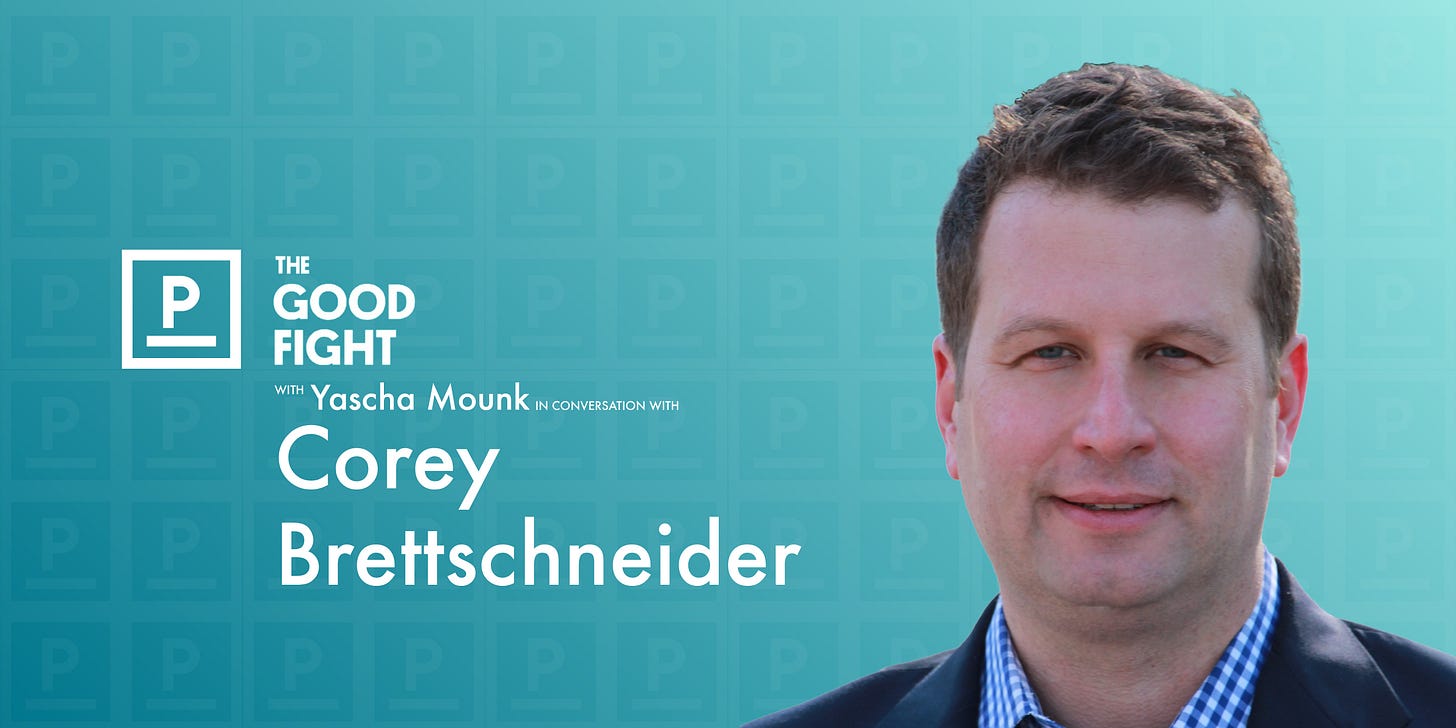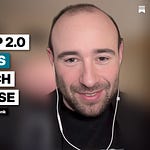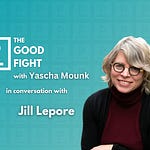Join us for our second annual Persuasion Festival next Sunday, the 31st! We’ll have virtual discussions on global illiberalism and on mental health, a fireside chat about misinformation, a live podcast recording with Coleman Hughes, and more. Lineup and registration here.
Corey Brettschneider is a professor of political science at Brown University, where he teaches constitutional law and political theory. He is the author of The Oath and the Office: A Guide to the Constitution for Future Presidents. He is also editor of the Penguin Liberty series, the most recent installment of which is devoted to great thinkers in the tradition of free speech.
In this week’s conversation, Yascha Mounk and Corey Brettschneider discuss why many Americans feel unable to speak their minds on key issues; the differences between a legal protection of free speech and a culture of free expression; and how we can build a culture that facilitates, rather than stifles, conversation on the issues which matter most.
The transcript has been condensed and lightly edited for clarity.
Yascha Mounk: You have just published and edited a collection of texts about free speech authored by some of the most important political thinkers, both past and present. In your own words, what is the fundamental case for free speech?
Corey Brettschneider: We're used to hearing about the importance of personal expression—the idea that a speaker is able to present their own ideas. This matters for its own sake. But for me, there's a more fundamental question, especially at this moment. And that's the idea that free speech is a fundamental right in a democracy—at least as important as voting rights, as essential as they are.
I take my cue from Alexander Meiklejohn’s argument about free speech and self-government: we can't imagine a democratic society in which we're limited in what we're able to say about politics. Here’s my spin on Meiklejohn. Imagine that in a town meeting, we’re debating whether to build a bridge on the north or south side of town. The moderator says he thinks the argument to build in the south side is stupid: “It's a bridge to nowhere. Nobody could possibly defend that.” And instead of just opining, the moderator actually cuts off debate from people who want to speak in favor of this “bad” position. This is a trivial example, but we could replace it with much more fundamental ones. And to my mind, what Meiklejohn is teaching us through that example, through the metaphor of a town meeting for democracy writ large, is that free speech matters—not just for personal expression, because you have to not only be able to make, but also be able to hear, arguments from all viewpoints in a democracy. That's my starting point.
Mounk: John Stuart Mill, whom you have in the book, gives a beautiful account of the good things that flow from having free speech. But there are many bad things that flow from not having free speech. It seems to me that people haven't thought or written enough about how the lack of it raises the stakes of political competition.
Part of the fundamental promise of a liberal democracy is to say, “We get to argue with each other, we have deep disagreements about who should govern. But, I know that if you win the election, I get to continue making my case, and I have a chance of winning in the next election.” If, however, I think, “Hey, if you win, then I might not be able to speak anymore, at all” that raises the stakes of political competition to such an extent that I may not be willing to accept your victory.
What has the book-writing process taught you not only about the good things about having free speech, but also the bad things that flow from not having it?
Brettschneider: To move forward with Meiklejohn’s metaphor: What would it look like for the moderator of the meeting to limit who could speak or who couldn't, based not on the amount of time that they were taking, but based on the viewpoint that they're expressing? It would mean the end of democracy. It would certainly mean less democracy.
To go from this hypothetical to a real example: Early in the American republic, when the Alien and Sedition Acts were passed, they weren’t just limits on the ability to mock John Adams. There really was a deeper problem, which is that the Alien and Sedition Acts were passed in order to shut down the opposition party. And before multiparty democracy really got going in the United States—right at the birth of it—there was an attempt to silence the other side. And so these things that might look innocuous in any one case, writ large, are, yes, a threat to the existence of democracy.
Mounk: One of the live controversies today about free speech is a fight between its legal understanding and its cultural role. We can look, for example, at a recent op-ed by the New York Times editorial board. A lot of people responded to it by saying, “Well, in the legal sense, free speech is not really under threat. There's no danger, at least right now, that the government will come and lock you up for criticizing Joe Biden or anything like that. Nobody ever said that we have a constitutional right to freedom from consequences. If polls show—as that which the New York Times editorial board commissioned did show—that 84% of the population thinks there's a real problem with people being afraid to say what they believe, that's not really a limitation on free speech. It's a category mistake to worry about that in terms of free speech.”
What does the tradition of thinking about free speech tell us about that argument? What does it tell us about the importance of having a culture of free speech?
Brettschneider: I tend to think the tradition is kind of weak in thinking about that problem in some ways. It's really highlighted as a contemporary problem. And part of the reason it seems so difficult to us is that the history of free speech has often been only about the question of coercion: Should the government ban or not ban?
When I read Mill, I think we should be very rigid in our rule: We should basically never allow the government to ban a view or opinion. And here I really am a free speech purist, even when it comes to the worst, most evil views, including those of the Ku Klux Klan or the Nazi party. When they're not engaged in direct threats, or in direct incitement of violence, I think they should, for Meiklejohn’s reasons, get protection. Meiklejohn himself was no Marxist, but he was concerned with protecting the rights of Communists who were preaching insurrection at the time. I think all of that is fundamental, but that's only part of the question.
The other part of the question, apart from government coercion, is about what society is thinking about. Mill was concerned to show us that free speech would lead to truth in some way. I might not be that ambitious, but I certainly think that if free speech is going to lead to a culture in which the ideas of democracy themselves are undermined by these anti-democratic groups that I mentioned, then that's an argument against democracy to begin with. So we have got to find a way, within the system of protecting all viewpoints, to ensure that some don't win. Now, that's a kind of paradox. Some people have thought it's impossible. I make the argument (in a book called When the State Speaks, What Should It Say?) that when citizens engage in speech, and when the government engages in its own speech, it's got to take a side—it can't be neutral between the Ku Klux Klan and democracy. It's got to take the side of liberal democracy.
A quote attributed to Robert Frost—sometimes said in jest or mocking—goes, “the liberal is a person who can't take his own side in an argument.” That can't be what liberalism is. There has to be a way to defend democratic values at the same time as protecting dissenting viewpoints. Once we've established the rule that the government can't punish speech based on the viewpoint it contains, the government has to take a stand in defense of liberal democracy, and it has to support those citizens who are protesting in opposition to groups like the Ku Klux Klan. Now, the danger lies in how you go about that. The more you can do it through reasoning, and the less through social sanction, all the better.
Mounk: What right do government institutions have to distinguish between a tolerant view and one that is hateful? As I understand it, you're trying to say, “Perhaps we can have a liberal state that recognizes the moral autonomy of its citizens in appropriate ways, but which can also nevertheless object to these kinds of hateful views, without outlawing them.” How do we thread the needle here?
Brettschneider: The government that is silent about hate speech, that says nothing about it and just protects it, is complicit in it.
And there is a way to not be silent, besides putting people in prison: the government creates public monuments. Presidents give official speeches, State of the Union addresses. Schools teach curricula that are not limiting speech, for instance, but that are advancing a certain kind of value and educating in a way that Mill thought would be essential for a society that was going to enjoy free speech. There are lots of ways for the government to not be complicit that don’t involve the act of coercion.
Mounk: You recognize the importance of the state remaining neutral. But if the state, in an authoritative way, is telling you that you are leading your life wrong, that would presumably be a violation of a kind of neutrality of a state that we value (if they say, for example, “That neo-Nazi rally, we're going to allow it to go ahead because that's the nature of our laws about free speech and assembly, but just to be clear, we hate those views.”)
When is it appropriate for the state to speak, and when is it not? And how do we make sure that when somebody with a really big stick (which is what a state official is) makes those kinds of pronouncements, that there isn't an implicit threat of punishment or ill-treatment?
Brettschneider: Government really does not undermine autonomy by taking a position like this in itself, as long as it's not engaged in coercive threats. Some people think that the government saying “This is right and this is wrong” is implicitly an insult to autonomy. I think that that's wrong. If I say to you that you’re wrong, I disagree with you, and give you reasons—that's respect for your autonomy. It's when I put you in prison, when I throw something at you—that is probably a disrespect for your autonomy. But engaging you in argument is actually the highest respect. It’s Kantian respect for your rationality.
If the government, in the first instance, can respond rationally by giving reasons, it's the opposite of an insult to autonomy. For the government to take a position is democracy defending autonomy in itself. Many people who are deserving of criticism and condemnation by citizens and the state, in my view, are themselves opposed to autonomy. Think of the Klan. They don't believe that Jewish people or black people are deserving of free speech. Their whole ambition is to create a white republic that denies those rights based on race. They're not pro-autonomy in the first place. And to the contrary, the defenders of autonomy, who show respect even for dissenters, I think are valuing autonomy rather than criticizing it.
The question of line-drawing is where a lot of the action has to be. I think that the harder the case becomes, the more the government and citizens actually should err on the side of listening and on the side of not condemning. That's not to say you can't advance views. But I don't want to let the fact that there are hard cases take away from the fact that sometimes the most extreme forms of criticism, even condemnation, are appropriate. Not to deny that there's a real issue here, but sometimes I hear complaints about cancel culture directed at mere criticism of QAnon, or of racist or white supremacist views, as if any attempt to say that a view has no place in society is misplaced. That's just not true—views that are a threat to democracy, that are anti-science, need to be criticized as strongly as possible. And that's consistent with respect for our autonomy.
Mounk: I agree with you that criticizing and reason-giving is, in fact, a sign of respect. But it may depend a little bit on the context. I walk into the CVS to buy a drug I need, and the pharmacist looks at me and asks why I am not wearing a headscarf or a longer skirt, if I'm a woman, or why I am not wearing a kippah, and so on. I might start to wonder, “Hang on a second, who are you to judge my behavior? That's not your role here.”
The concern about the state is: Is the state an interlocutor that is entitled to challenge me in that kind of way? As the 19th century political thinker Benjamin Constant might have put it: “suddenly, the agent that I've hired to do a bunch of tasks on my behalf is behaving like my educator.”
Brettschneider: There are some people who think that that's enough of a worry that the government should just be quiet; that the pharmacist, once he or she starts speaking, is going to do a bad job, and that it's just not their role. And I think there's something to that. Sometimes the government speaks about things that it really has no business in. If government were really dictating to me on questions of the good life (the kind of sexual relationship that I have, whether to get married), then I think that's not the kind of thing that's essential for government to do.
Justifications for free speech are based on the idea of listening and hearing so that we—as autonomous citizens of a democracy—can make decisions about what to do collectively. Government has no business telling me who I go home to. But there are other things that are relevant to democracy. There is a fundamental obligation of government to criticize, condemn, and oppose the views of the Klan or Nazis. While the issues of the good life are fundamental to our collective existence as a self-governing people, people who hold these extreme views are opponents of democracy.
If you're raising your kids in a way that is white supremacist, to go back to the Klan example, and government is engaged in trying to undo that through schooling and through teaching that the Klan is not consistent with the idea of the equal protection clause in the 14th Amendment. The fact that you’re doing the teaching in your homes does not offer immunity from criticism.
Mounk: Let's go back for a moment to disentangling where so-called “cancel culture” is a problem and where it's not. I agree with you that in some situations, criticism of certain views is often inappropriately described as cancel culture. There is certainly a very sloppy set of uses of the phrase “cancel culture” on the political right, where everything from punishment for crimes that people have committed to even robust criticism, are described as cancel culture. I do bristle a little bit at the emphasis that people put on that, because I agree that those arguments are often made in bad faith, and we needn't take them seriously.
But when an overwhelming majority of the American public—including an overwhelming majority of every demographic group, including Latinos and black people—say that they worry about the censorious nature of American public discourse, and hold their tongues in many situations for fear of consequences, that’s not bad faith. They perceive today that expressing their views on matters might have very real consequences, like the loss of a job, social shunning or shaming, and being cast out of their communities for reasons that can be based in a misunderstanding, straight-out lies, or false rumors.
How would you describe the current situation of the United States in terms of our freedom from fear of arbitrary collective sanction? And what can we do to create a culture—if you agree with me that there is a problem—where that is less of a concern?
Brettschneider: I think it's a question of overcorrection, possibly. I do think about it, because you and I agree that when it comes to these extreme views, the government should be defending democracy. Which is to say, democracy has to defend itself.
Take teacher firing, for example. Should you be able to fire a teacher who is a member of the Klan or, to take very real cases, who's on Facebook saying not just offensive, but racist things? And I think you should. That follows from my view that the government has to find ways to promote its own message—and the Supreme Court has agreed with me here—that government officials who undermine the purposes of their job by saying things that are at odds with their job can be fired.
Now, has there also been an effect of that part of our culture that's led to an overcorrection, where people are fearful of making arguments about issues that really aren't questions of white supremacy: whether affirmative action, for instance, is a violation of equal protection, as the Supreme Court is likely to decide in the near future? I'm a defender of affirmative action. But if you take the opposite position and want to say that it's not consistent with equal protection, I recognize that's a real legal and moral debate. I don't think that's grounds for firing. How do you walk that line? One way to do it is to say the government is just really bad at this, and there shouldn't be a bright line rule. I hear people say that university presidents, for instance, who opine on campus controversies, should just be silent. In fact, one deep disagreement I have with the drafters of the Chicago Principles on free speech is that it really defends neutrality on the grounds that it's just not the competence of university presidents or officials to do this. I think that can't be right, either: the problem of complicity is so serious that the government has to, in some instances, speak up. But we've got to draw the line when it comes to issues about which there is reasonable disagreement. I gave affirmative action as one one example.
It's maybe inevitable that we're going to have tensions about where that line is. What we can do is to promote, as best we can, a culture of dialogue and conversation. Now, that might not be a satisfying answer if you want a bright line rule, but I am more of a balancer of principles. We've got to recognize that there are goals on both sides of government and culture that promote equality, but that the autonomy to speak out also matters, and that there are ways of undermining it that aren't just based in criminalization—they might be based in a culture that that really disallows conversation on fundamental issues that we absolutely are obligated to be talking about.
Mounk: When you look at the response to the Times editorial, there are two elements which are at odds with each other.
The first is: “What are you talking about? There's no such thing as cancel culture. This is all just an invention of Fox News,” which I think is contradicted by the fact that most of the polled population seem to think that there is a problem.
The other response is logically inconsistent: “Well, it used to be black people, gay people, or atheists who were afraid to speak out for their interests and their views.” That’s completely true. But it's doing very weird argumentative work—the implication seems to be, “And therefore, this is not a problem.” Surely, the past was unjust, but shouldn’t the response to that be, “Let us finally build a culture where there aren't people who are afraid to speak out”?
Brettschneider: Mill’s thesis was that over time, deliberation and free speech will result in the truth, because the good ideas will win out and the bad ones won't. Even ideas that might be correct, in Mill’s sense, have to be challenged and refined. That's a hard culture to design. What I hear you saying is that we don't have that right now. I certainly do hear a lot of people saying that one of the most powerful things in the Times op-ed was the survey that shows, as you were referencing, that lots of people feel that way as well. It suggests that we don't have a culture of deliberation; we have a culture of rigidity. I think it's largely an educative process of just trying to create spaces of deliberation as much as possible. And then giving people—when they don't respond with argument but with insults—a response about why these actually are real issues.
It often looks like two separate sides battling one another unless you start, as you and I often do, with the commitment to liberal democracy. And if you start that way, it's the same issue: black people in this country feeling silenced is a threat to their fundamental equality and their autonomy. Over time, we've realized that and rightly have begun to focus on all of us looking at what we're doing in conversation, who we're mentoring and hiring and how we're behaving in the actual interactions, to fix that problem. When people talk about structural racism, that sort of subtle silencing is often what we're talking about.
Now, when we talk about even the CEO—it's a very different position, of course, a position of privilege—not feeling not able to speak out, I'd say that's also a problem for liberal democracy. You need the powerful to be transparent about their views. One of the problems of not having that transparency is that they're still going to act on them; we just won't be able to examine those views or discuss them in public. That's not a healthy thing for democracy, either. I'd say it’s partly an issue of courage. If you're in a position of privilege, yes, there are external factors, I think that might be leading to that silencing. But I also feel that you have an obligation to say what you believe as a member of a powerful institution. We don't hear enough on the left, or from liberal Democrats, about our obligation to create atmospheres of deliberation, but also to take the risk and to speak out. I know there's social sanction that comes with it. But those on the left and on the right have to do it.
Some of the best exchanges that I've had during the Trump era have been with people who certainly were not on my side of things, politically. They're not on the extreme right (they were often Trump opponents), but we disagreed deeply about matters like affirmative action or abortion rights. One is a good friend, Steve Calabresi, the Federalist Society founder, who called for Trump's impeachment. Do we agree about everything? No, but we've often done events together. I know that that's not a popular view among many who share my political conclusions, but I think that's a desperate need in liberal democracy: to create a culture of dialogue among people who disagree not about the fundamentals that we began with, but within a wide range of policy issues. Libertarianism is not a view that I agree with. Do I think that's a view that has to be silenced and condemned, and that you should be fired for it? No, of course not. It's a fundamental justification of the way that much of our society thinks and has operated. And if we don't have that space, the peril is to the left—that it doesn't give us a realm of ideas in which to engage, convince, and persuade. The stakes are very high, so I would say to people: have courage here.
Podcast production by John T. Williams and Brendan Ruberry. Podcast cover image by Joe O’Shea.
Connect with us!
Twitter: @Yascha_Mounk & @JoinPersuasion
YouTube: Yascha Mounk, Persuasion
LinkedIn: Persuasion Community













